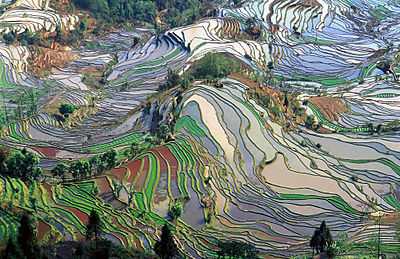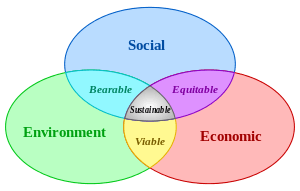Political ecology

| Part of a series on |
| Anthropology of nature, science and technology |
|---|
|
Basic concepts |
|
Major theorists |
| Social and cultural anthropology |
| Part of a series on |
| Politics |
|---|
 |
|
Academic disciplines |
|
Organs of government |
|
Related topics
|
|
Subseries |
| Politics portal |
Political ecology is the study of the relationships between political, economic and social factors with environmental issues and changes. Political ecology differs from apolitical ecological studies by politicizing environmental issues and phenomena.
The academic discipline offers wide-ranging studies integrating ecological social sciences with political economy (Peet and Watts 1996, p. 6) in topics such as degradation and marginalization, environmental conflict, conservation and control, and environmental identities and social movements (Robbins 2012).
Origins
The term "political ecology" was first coined by Frank Thone in an article published in 1935 ("Nature Rambling: We Fight for Grass," The Science Newsletter 27, 717, Jan. 5: 14). It has been widely used since then in the context of human geography and human ecology, but with no systematic definition. Anthropologist Eric R. Wolf gave it a second life in 1972 in an article entitled “Ownership and Political Ecology,” in which he discusses how local rules of ownership and inheritance “mediate between the pressures emanating from the larger society and the exigencies of the local ecosystem” (Wolf 1972, p. 202). Other origins include other early works of Wolf as well as John W. Cole at the University of Massachusetts, Hans Magnus Enzensberger and others in the 1970s and 1980s.
The origins of the field in the 1970s and 1980s were a result of the development of development geography and cultural ecology (Bryant 1998, p. 80). Historically, political ecology has focused on phenomena in and affecting the developing world; since the field’s inception, “research has sought primarily to understand the political dynamics surrounding material and discursive struggles over the environment in the third world” (Bryant 1998, p. 89).
Scholars in political ecology are drawn from a variety of academic disciplines, including geography, anthropology, development studies, political science, sociology, forestry, and environmental history. Some prominent contemporary scholars include:
- Tom Bassett
- Simon Batterbury
- Anthony Bebbington
- Piers Blaikie
- Harold Brookfield
- Diana K. Davis
- Michael R. Dove
- Robyn Eckersley
- Arturo Escobar
- Susanna Hecht
- Jake Kosek
- Richard Peet
- Nancy Lee Peluso
- Paul F. Robbins
- Dianne Rocheleau
- Nathan Sayre
- Michael Watts
- Karl Zimmerer
- Raymond Bryant
Overview
Political ecology’s broad scope and interdisciplinary nature lends itself to multiple definitions and understandings. However, common assumptions across the field give it relevance. Raymond L. Bryant and Sinéad Bailey have developed three fundamental assumptions in practicing political ecology:
- First, costs and benefits associated with environmental change are distributed unequally. Changes in the environment do not affect society in a homogenous way: political, social, and economic differences account for uneven distribution of costs and benefits.
- Second, this unequal distribution inevitably reinforces or reduces existing social and economic inequalities. In this assumption, political ecology runs into inherent political economies as “any change in environmental conditions must affect the political and economic status quo.” (Bryant and Bailey 1997, p. 28).
- Third, the unequal distribution of costs and benefits and the reinforcing or reducing of pre-existing inequalities holds political implications in terms of the altered power relationships that now result.
In addition, political ecology attempts to provide critiques as well as alternatives in the interplay of the environment and political, economic and social factors. Robbins asserts that the discipline has a “normative understanding that there are very likely better, less coercive, less exploitative, and more sustainable ways of doing things” (2012).
From these assumptions, political ecology can be used to:
- inform policymakers and organizations of the complexities surrounding environment and development, thereby contributing to better environmental governance.
- understand the decisions that communities make about the natural environment in the context of their political environment, economic pressure, and societal regulations
- look at how unequal relations in and among societies affect the natural environment, especially in context of government policy
These assumptions are based in the fields of stratification between corporate producers, civil society, and the state. Stratification influences policy analysis since the power of civil society or corporations will determine the outcome of environmental change.
Scope and influences
Political ecology’s movement as a field since its inception in the 1970s has complicated its scope and goals. Through the discipline’s history, certain influences have grown more and less influential in determining the focus of study. Peter A. Walker traces the importance of the ecological sciences in political ecology (Walker 2005, p. 74). He points to the transition, for many critics, from a ‘structuralist’ approach through the 1970s and 1980s, in which ecology maintains a key position in the discipline, to a ‘poststructuralist’ approach with an emphasis on the ‘politics’ in political ecology (Walker 2005, p. 74-75). This turn has raised questions as to the differentiation with environmental politics as well as the field’s use of the term of ‘ecology’. From a geographical point of view, recent political ecological research shifted partially from investigating the politics' influence on the earth's surface to the focus on spatial-ecological influences on politics and power—a scope reminiscent of environmental politics.
The discipline has drawn much from cultural ecology, a form of analysis that showed how culture depends upon, and is influenced by, the material conditions of society (political ecology has largely eclipsed cultural ecology as a form of analysis according to Walker, 2005). As Walker states, “whereas cultural ecology and systems theory emphasize[s] adaptation and homeostasis, political ecology emphasize[s] the role of political economy as a force of maladaptation and instability” (2005, p. 74).
Political ecology will often utilize the framework of political economy to analyze environmental issues. Early and prominent examples of this were The Political Economy of Soil Erosion in Developing Countries by Piers Blaikie in 1985, which traced land degradation in Africa to colonial policies of land appropriation, rather than over-exploitation by African farmers, and Silent Violence: Food, Famine and Peasantry in Northern Nigeria by Michael Watts in 1983, which traced the famine in northern Nigeria during the 1970s to the effects of colonialism, rather than an inevitable consequence of the drought in the Sahel.
The movement of the field has changed, broadened and complicated its scope and goals.
Relationship to anthropology and geography
Originating in the 18th and 19th centuries with philosophers such as Adam Smith, Karl Marx, and Thomas Malthus, political economy attempted to explain the relationships between economic production and political processes (Ritzer 2008: 28; Perry 2003: 123). It tended toward overly structuralist explanations, focusing on the role individual economic relationships in the maintenance of social order (Wolf 1997: 7-9). Within anthropology, Eric Wolf pushed political economy towards a neo-Marxist framework which began addressing the role of local cultures as a part of the world capitalist system as opposed to earlier political economists and anthropologists who viewed those cultures as “'primitive isolates'” (Wolf 1997: 13). This approach to ethnography, however, still lacked an attention to environmental effects on political and economic processes and is still sometimes criticized for looking to structural explanations for cultural phenomena (Perry 2003: 123).
Conversely, Julian Steward and Roy Rappaport's theories of cultural ecology are sometimes credited with shifting the functionalist-oriented anthropology of the 1950s and 1960s toward a more scientific anthropology, incorporating ecology and environment into ethnographic study (Perry 2003: 154-157). Yet, these theories were later found to be lacking by many anthropologists as they were criticized for “separat[ing] economic from other aspects of life, even in the process of showing the ways in which they interact with one another” (Perry 2003: 157). In other words, cultural ecology was good at exploring function in the nature-culture dichotomy, but the conclusions drawn from that theoretical position tended to ignore the impact of environment on political and economic factors.
Recognizing these flaws in political economy and cultural ecology, geographers and anthropologists (Wolf 1972; Watts 1983; Blaikie 1985; Hecht & Cockburn 1990; Peluso 1992; Greenberg & Park 1994; Hershkovitz 1993) worked with the strengths of both to form the basis of political ecology. This approach focuses on issues of power, recognizing the importance of explaining environmental impacts on cultural processes without separating out political and economic contexts. These approaches tended to emphasize local, minority, and indigenous knowledge (Ervin 130) while moving away from privileging a Western nature-culture dichotomy.
The application of political ecology in the work of anthropologists and geographers differs depending on what the scholar is seeking to emphasize. While any approach will take both the political/economic and the ecological into account, some approaches will place more emphasis on the political while others will place more emphasis on the ecological. Some, such as geographer Michael Watts, focus on political impacts on access to environmental resources. This approach tends to see environmental harm as both a cause and an effect of “'social marginalization'” (Paulson 2003: 205).
Others, such as Andrew Vayda and Bradley Walters (1999), criticize political ecologists for pre-supposing “the importance … of certain kinds of political factors in the explanation of environmental changes” (167). Vayda and Walter's response to overly political approaches in political ecology is to encourage what they call “event ecology” (Vayda & Walters 1999: 169), focusing on human responses to environmental events with an eye on political reactions to the events instead of presupposing the impact of political processes on environmental events.
As with any theoretical approach in the social sciences, political ecology has its strengths and weaknesses. At its core, political ecology makes great strides in attempting to contextualize political and ecological explanations of human behavior. But as Walker (2006) points out, it has failed to offer “compelling counter-narratives” to “widely influential and popular yet deeply flawed and unapologetic neo-Malthusian rants such as Robert Kaplan's (1994) 'The coming anarchy' and Jared Diamond's (2005) Collapse” (385). Another problem is the neo-Marxist nature of political ecology in a world where policy decisions are dominated by a global capitalist system (Walker 2006: 388-389). Ultimately, applying political ecology to policy decisions – especially in the US and Western Europe – will remain problematic as long as there is a resistance to Marxist and neo-Marxist theory. Founded in 2010 in Brasil and Canada, the Socio Ecolo Evolutionists [1] are influenced by Thoreau, Reclus or Gandhi. They struggle in a local-global perspective to defend the diversity of ways of life, the choice and a global Pact for collective survey.[2]
Relationship to conservation
When speaking of political ecology and conservation, one ultimately finds that there is a divergence of ideas, issues, and troubles, especially when looking at conservation through biodiversity and the creation of conservation units. Sutton (2004) defines political ecology as “the study of the day-to–day conflicts, alliances, and negotiations that ultimately result in some sort of definitive behavior; how politics affects or structures resource use” (311). It is a matter of who is involved and what they eventually want the outcome to be, such as the views from NGOs or those of the local people and the government of the occupied land. They must all consider their involvement in this matter. Are the actions local people contributing an asset to the area or are they in effect causing more harm than good? Are the NGOs helping the situation and for whose benefit? What is the government’s role in this; where do they stand?
Biodiversity, meaning biological diversity, can be briefly defined as “the number and dominance of species present in an ecosystem” (Sutton 2004: 308). Many, however, feel that in cases where the local indigenous people are using slash and burn are, in effect, harming the area or in other cases where logging is being done. In some cases, biosphere reserves have been created. Hanna et al. states:
Biosphere reserves can be platforms for building place specific, mutually reinforcing policies and practices that facilitates conservation and sustainable use of biodiversity, economic growth and other needs and aspirations of local communities and the emergence of knowledge based governance and management arrangements at local, provincial and national levels. (2008: 21)
These reserves are made in places such as conservation units like protected areas. It is important to not forget about the people who are also affected by the creation of these units.
With the creation of these conservation units, “political ecologists have devoted some energy to the study of protected areas, which is unsurprising given political ecology’s overall interest in forms of access to, and control over resources” (Hanna, et al. 2004: 203). The local people must in some cases show that they are as important as the area which they occupy, despite the thought that those who slash and burn are seen as doing harm. Most people have occupied the same areas for many generations and, because of their practices, can also be seen as an important aspect of the area. Just as, Dove and Carpenter state, “indigenous people have important environmental knowledge which could contribute to conservation” (2008: 4). However, some people are removed from the land. In any case, others who get involved such as NGOs and the government then make decisions about who can access the land and how it can be used, putting regulations on the local people. Sutton explains this as:
In a few cases, perhaps especially tragic local groups have been displaced to create national parks and reserves to ‘conserve’ the forest. Fortunately, most conservation bodies are now aware that, if a group has been using and managing a forest for several thousand years, throwing it off the land is more apt to destroy the forest ecosystem than to preserve it. (2004: 302)
Related journals
Scholarly journals that have been key to the development (and critique) of this field include:
- Annals of the Association of American Geographers
- Antipode
- Development and Change
- Journal of Peasant Studies
- Ecological Economics
- Ecology
- Economic Geography
- Environment and Planning
- Futures
- Geoforum
- Human Ecology
- Journal of Political Ecology
- New Left Review
- Progress in Human Geography
- Progress in Physical Geography
See also
- Cultural ecology
- Development geography
- Ecological crisis
- Eco-socialism
- Ecogovernmentality
- Environmental sociology
- Green state
- Human behavioral ecology
- List of ecology topics
- Political economy
- Social ecology
References
Notes
Bibliography
- Blaikie, P., and Brookfield, H. Land Degradation and Society. Methuen: 1987.
- Blaikie, Piers. 1985. The Political Economy of Soil Erosion in Developing Countries. London; New York: Longman.
- Bryant, Raymond L. 1998. Power, knowledge and political ecology in the third world: a review, Progress in Physical Geography 22(1):79-94.
- Bryant, Raymond L. and Sinead Bailey. 1997. Third World Political Ecology. Routledge.
- Dove, Michael R., and Carol Carpenter, eds. 2008. Environmental Anthropology: A Historical Reader. MA: Blackwell.
- Escobar, Arturo. 1996. “Construction Nature: elements for a post-structuralist political ecology”. Futures 28(4): 325-343.
- Greenberg, James B. and Thomas K. Park. 1994. Political Ecology, Journal of Political Ecology 1: 1-12.
- Hecht, Susanna & Alexander Cockburn. 1990 [Updated edition 2010]. Fate of the Forest: Developers, Destroyers, and Defenders of the Amazon. University of Chicago Press.
- Hershkovitz, Linda. 1993. Political Ecology and Environmental Management in the Loess Plateau, China, Human Ecology 21(4): 327-353.
- Martinez-Alier, Joan. 2002. The Environmentalism of the Poor: A Study of Ecological Conflicts and Valuation. Edward Elgar.
- Paulson, Susan, Lisa L. Gezon, and Michael Watts. 2003. Locating the Political in Political Ecology: An Introduction, Human Organization 62(3): 205-217.
- Peet, Richard and Michael Watts. 1993. Introduction: Development Theory and Environment in an Age of Market Triumphalism, Economic Geography 68(3): 227-253.
- Peet, Richard, Paul Robbins, and Michael Watts. (eds.) 2011. Global Political Ecology. Routledge.
- Peet, Richard and Michael Watts. eds. 1996. Liberation ecologies: environment, development, social movements. Routledge.
- Peluso, Nancy Lee. 1992. Rich Forests, Poor People: Resource Control and Resistance in Java. University of California Press.
- Peluso Nancy Lee & Michael Watts (eds.). 2001. Violent Environments. Cornell University Press.
- Perry, Richard J. 2003. Five Key Concepts in Anthropological Thinking. Upper Saddle River, NJ: Prentice Hall.
- Ritzer, George. 2008. Modern Sociological Theory. Boston: McGraw-Hill.
- Robbins, Paul. 2012. Political Ecology: A Critical Introduction. 2nd ed. Blackwell.
- Rocheleau, D. 1995. Gender and a Feminist Political Ecology Perspective, IDS Institute for Development Studies 26(1): 9-16.
- Sayre, Nathan. 2002. Species of Capital: Ranching, Endangered Species, and Urbanization in the Southwest. University of Arizona Press.
- Sutton, Mark Q. and E.N. Anderson. 2004. Introduction to Cultural Ecology. Altamira.
- Vayda, Andrew P. and Bradley B. Walters. 1999. Against Political Ecology, Human Ecology 27(1): 167-179.
- Walker, Peter A. 2005. Political ecology: where is the ecology? Progress in Human Geography 29(1):73–82.
- Watts, Michael. 1983 [reprinted 2013]. Silent Violence: Food, Famine and Peasantry in Northern Nigeria. University of California Press.
- Watts, Michael. 2000. “Political Ecology.” In Sheppard, E. and T. Barnes (eds.), A Companion to Economic Geography. Blackwell.
- Walker, Peter A. 2006. Political ecology: where is the policy? Progress in Human Geography 30(3): 382-395.
- Wolf, Eric. 1972. Ownership and Political Ecology, Anthropological Quarterly 45(3): 201-205.
External links
- Journal of Political Ecology (open access)
- Cultural and Political Ecology Specialty Group of the Association of American Geographers. Archive of newsletters, officers, award and honor recipients, as well as other resources associated with this community of scholars.
| |||||||||||||||||||||
| ||||||||||||||||||
